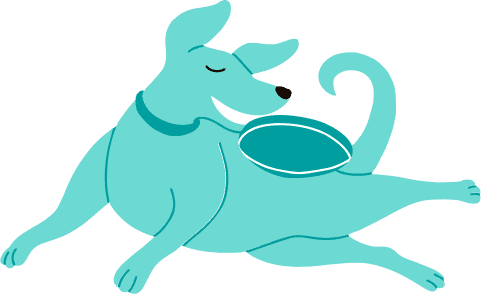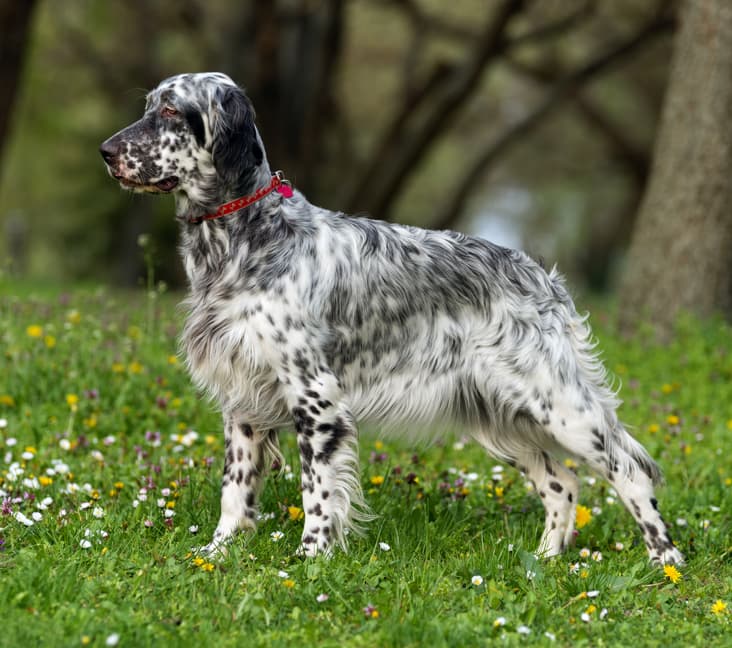Nova Scotia Duck Tolling Retrievers typically reach a height of 17 to 21 inches at the shoulder for males, and smaller for females. As for weight, they usually weigh between 32 and 68 pounds, with females being on the lighter side and males on the heavier side.
Nova Scotia Duck Tolling Retriever
Breed Type: Sporting
Common nicknames: Toller, Duck Toller, Tolling Retriever, Little Red Duck Dog
Coat: Double
Hypoallergenic: No, they will likely trigger allergies.
Temperament: Energetic, playful, affectionate, intelligent
Life expectancy: 12-14 years
Color & patterns:

Nova Scotia Duck Tolling Retrievers, affectionately known as “Tollers,” are not your average retrievers. With their medium-sized frames and sleek coats, Tollers are ready to tackle any mission that comes their way thanks to their intelligence and athleticism. They’re always one step ahead, strategizing and problem-solving with the finesse of a canine Sherlock Holmes. When it comes to everyday adventures, these pups bring their A-game too. Whether it’s a game of fetch in the park or an outdoor excursion, Tollers never fail to impress with their boundless energy and wit.
Nova Scotia Duck Tolling Retriever characteristics
Learn about about Nova Scotia Duck Tolling Retriever basics like their fur colors, shedding levels, how much grooming they need, and other Nova Scotia Duck Tolling Retriever facts.
Average height
17-21 inches (43.2-53.3cm)
Average weight
32-68 pounds (14.5-30.8 kg)
Average lifespan
12-14 years
Exercise needs
Grooming needs
Full-grown size
Good with cats
Good with kids
Training aptitude
Do Nova Scotia Duck Tolling Retrievers shed?
Yes, Nova Scotia Duck Tolling Retrievers shed. They have a double coat: a dense undercoat to keep them warm and a water-resistant outer coat. Shedding can vary, but they generally have seasonal shedding where they’ll shed their undercoat more heavily twice a year. Regular grooming can help manage their shedding and keep their coat looking neat and healthy.
Are Nova Scotia Duck Tolling Retrievers hypoallergenic?
No, Nova Scotia Duck Tolling Retrievers are not hypoallergenic. They shed and have a double coat, which can produce dander and trigger allergies in sensitive individuals. If someone in the household has allergies, it’s essential to consider this factor before bringing a Nova Scotia Duck Tolling Retriever into the home. Regular grooming and vacuuming can help reduce allergens, but they won’t eliminate them completely.
Are Nova Scotia Duck Tolling Retrievers rare?
Nova Scotia Duck Tolling Retrievers aren’t as common as some other breeds, but they’re not extremely rare either. Their unique skills and friendly nature make them popular among hunting enthusiasts and families alike. So, while you might not see them as frequently as Labradors or Golden Retrievers, they’re still around and cherished by many.
How long do Nova Scotia Duck Tolling Retrievers live?
Nova Scotia Duck Tolling Retrievers typically live between 12 and 14 years when they receive proper care and nutrition. Like all breeds, they can be susceptible to certain health issues, so regular vet check-ups and a balanced diet can help them live a healthy and active life.
When do Nova Scotia Duck Tolling Retrievers stop growing?
Nova Scotia Duck Tolling Retrievers usually stop growing in height by around nine to 12 months of age. However, they might continue to fill out and develop muscle until they’re about two years old.
Nova Scotia Duck Tolling Retriever history
Learn about where the Nova Scotia Duck Tolling Retriever came from.
What were Nova Scotia Duck Tolling Retrievers bred for?
Nova Scotia Duck Tolling Retrievers were bred for hunting, particularly for luring ducks within gunshot range. Their playful antics and movements near the shoreline would attract the curiosity of the ducks, making them come closer to the hunters.
Where are Nova Scotia Duck Tolling Retrievers from?
Nova Scotia Duck Tolling Retrievers hail from Canada, specifically from the province of Nova Scotia.
Nova Scotia Duck Tolling Retriever temperament
Learn about about the Nova Scotia Duck Tolling Retriever temperament and how well they fit into your lifestyle, home environment, and family.
Are Nova Scotia Duck Tolling Retrievers good with kids?
Generally, Nova Scotia Duck Tolling Retrievers are good with kids. They’re energetic and enjoy playing, which can make them wonderful playmates for children.
As always, it’s important for pet parents to teach their dogs how to gently interact with children and supervise all interactions with them to make sure everyone stays safe. It’s also crucial for parents to teach kids how to gently interact with all dog breeds and recognize when they need space.
Do Nova Scotia Duck Tolling Retrievers bark a lot?
Nova Scotia Duck Tolling Retrievers can be vocal, but whether they bark a lot depends on the individual dog and their training. With proper training and socialization, you can manage their barking to be appropriate and not excessive.
Are Nova Scotia Duck Tolling Retrievers good family dogs?
Yes, they make excellent family dogs. They’re energetic, playful, and affectionate, making them great companions for active families who enjoy outdoor activities.
Are Nova Scotia Duck Tolling Retrievers good with cats?
Yes, Nova Scotia Duck Tolling Retrievers can get along with cats, especially if they’re introduced and socialized with them from a young age. However, their hunting instincts might kick in around smaller animals, so it’s crucial to supervise their interactions and ensure they coexist peacefully.
Are Nova Scotia Duck Tolling Retrievers good with other dogs?
Yes, Nova Scotia Duck Tolling Retrievers generally get along well with other dogs, especially if they're socialized early on. Their friendly and playful nature often makes them enjoy the company of other dogs.
Are Nova Scotia Duck Tolling Retrievers smart?
Yes, Nova Scotia Duck Tolling Retrievers are smart. Their intelligence, combined with their eagerness to learn, makes them capable of quickly picking up commands and tricks.
Are Nova Scotia Duck Tolling Retriever friendly?
Yes, Nova Scotia Duck Tolling Retrievers are known for their friendly, sociable nature. They often enjoy meeting new people and can be quite welcoming to guests, making them excellent companions for social activities and outings.
Are Nova Scotia Duck Tolling Retrievers easy to train?
Yes, this breed is intelligent and eager to please, which makes them relatively easy to train. Positive reinforcement methods work well, as they respond positively to praise and treats. Just keep in mind that even if a certain dog breed is known to be easy to train, teaching a dog requires a long-term commitment.
Nova Scotia Duck Tolling Retriever health
Learn about about the Nova Scotia Duck Tolling Retriever health outlook and what diseases they may be prone to at various stages of their life.
Do Nova Scotia Duck Tolling Retrievers have health problems?
Like all breeds, Nova Scotia Duck Tolling Retrievers can be prone to certain health issues, including:
Hip and/or elbow dysplasia: Hip and elbow dysplasia are two of the most common skeletal diseases seen in dogs. They are similar diseases in which either the hip or elbow joint has grown abnormally or is misshapen. The abnormal shape prevents the joints and sockets from properly meeting one another, resulting in rubbing and grinding instead of sliding smoothly. Unlike in hip dysplasia, where the main problem is joint instability, the abnormalities seen in elbow dysplasia often result in pieces of bone and/or cartilage breaking loose and irritating the joint tissues. Over time, the rubbing from dysplasia can cause a variety of issues, such as pain, lameness, and secondary osteoarthritis. Surgery can be done to fix the joint if diagnosed before the onset of arthritis.
Eye issues: This breed may develop cataracts, a common eye condition that causes cloudiness in the eye and obstructs vision; Collie eye anomaly, a congenital defect that causes abnormalities or unusual changes in the eye and may lead to blindness; and progressive retinal atrophy (PRA), a progressive degenerative disease affecting the retina that eventually leads to blindness.
Addison's disease: Addison's disease, also known as "hypoadrenocorticism," is caused by a malfunction in the hormone production of the adrenal glands. The adrenal glands are small glands near the kidneys and are responsible for a variety of body functions, such as controlling salt, sugar, and water balance in the body. In Addison's disease, the body is unable to create create enough cortisol. Without cortisol, a dog cannot manage stress or digest food properly. Dogs with Addison's disease may suffer from weakness, an abnormally fast heart rate, depression, loss of appetite, diarrhea, and excessive thirst and urination. Your vet can test your pup to detect Addison's disease and provide long-term medication.
Others: This breed may also develop immune disorders such as autoimmune thyroiditis, which causes low thyroid hormone production and deafness.
Regular vet check-ups, maintaining a healthy weight, and proper exercise can help mitigate some of these risks.
Popular Nova Scotia Duck Tolling Retriever mixes
A common Nova Scotia Duck Tolling Retriever mix:
German Shorthair Toller (Nova Scotia Duck-Tolling Retriever + German Shorthaired Pointer)

Find Nova Scotia Duck Tolling Retriever puppies near you
Adopting a Nova Scotia Duck Tolling Retriever
We don't see any Nova Scotia Duck Tolling Retrievers available for adoption in your exact location or cities near you, but here are some adorable similar breeds in Beverly Hills, CA.

Harper
Golden Retriever
Female, 2 yrs 1 mo
West Hollywood, CA

Hunter
Golden Retriever
Male, 2 yrs 7 mos
West Hollywood, CA
House-trained
Spayed or Neutered
Shots are up-to-date

Jet
Golden Retriever
Male, 3 yrs 1 mo
West Hollywood, CA
House-trained
Spayed or Neutered
Shots are up-to-date

Blaze
Golden Retriever
Male, 2 yrs
West Hollywood, CA

Sundrop
Golden Retriever Australian Shepherd
Female, young
Beverly Hills, CA
Not good with dogs
Spayed or Neutered
Shots are up-to-date

Max & McKinley
Golden Retriever Shepherd (Unknown Type)
Male, 2 yrs 9 mos
Los Angeles, CA
Good with dogs
House-trained
Spayed or Neutered
Shots are up-to-date

Makai
Golden Retriever
Male, adult
Los Angeles, CA
Not good with dogs
Not good with cats
House-trained
Spayed or Neutered
Shots are up-to-date

Guero
Golden Retriever
Male, senior
Los Angeles, CA
Good with dogs
Not good with cats
House-trained
Spayed or Neutered
Shots are up-to-date

Harper
Golden Retriever
Female, 2 yrs 1 mo
West Hollywood, CA

Hunter
Golden Retriever
Male, 2 yrs 7 mos
West Hollywood, CA
House-trained
Spayed or Neutered
Shots are up-to-date

Jet
Golden Retriever
Male, 3 yrs 1 mo
West Hollywood, CA
House-trained
Spayed or Neutered
Shots are up-to-date

Blaze
Golden Retriever
Male, 2 yrs
West Hollywood, CA

Sundrop
Golden Retriever Australian Shepherd
Female, young
Beverly Hills, CA
Not good with dogs
Spayed or Neutered
Shots are up-to-date

Max & McKinley
Golden Retriever Shepherd (Unknown Type)
Male, 2 yrs 9 mos
Los Angeles, CA
Good with dogs
House-trained
Spayed or Neutered
Shots are up-to-date



